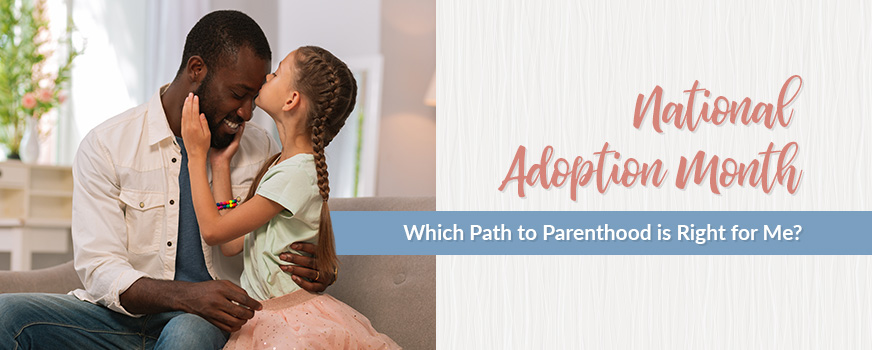
November is National Adoption Awareness Month, an important subject many consider when on the path to parenthood. Read below to learn more about two different methods of growing your family, adoption and fertilization treatments, and which is right for you.
About National Adoption Month
For over two decades, National Adoption Month has been promoted and celebrated every November in communities across the country. During the initiative month, many national, state, and local agencies as well as foster, kinship care, and adoptive family groups will help educate their communities through programs, events, and activities that help raise awareness about the thousands of children and youth currently in foster care who are waiting for their own permanent, loving families.
Paths to Parenthood: Adoption & IVF
Adoption
Adoption has long been a great choice to place children with parents who will love and nurture them. Children who are adopted can be newborns or older children, foster children, children from the U.S., or children from other countries. Parents who adopt might be couples struggling to achieve pregnancy for a number of reasons. The role that biological parents play in the life of an adopted child varies widely from case to case. Adoption comes with it’s own set of expenses and legal considerations. Most adoptions are facilitated by an adoption agency, which helps pair children with prospective parents and navigate the many steps to adoption.
Fertility Treatments
In vitro fertilization (IVF) is a process where the egg is fertilized by sperm outside of the womb. For those who are struggling to get pregnant, it’s the most common first option. Once the egg is fertilized, it is placed back in the uterus and for the mother to carry the child to term. The success rate of IVF depends on a variety of factors, including age, lifestyle, reproductive history, and reason for difficulty achieving pregnancy. IVF can be a great option for individuals who have issues like blocked or damaged fallopian tubes, male fertility issues, or certain genetic disorders that impact the ability to achieve pregnancy. Pregnancy through IVF requires significant time, physical, emotional, and financial commitments.

Adoption or IVF?
While they are two very different processes, in vitro fertilization and adoption do have a few things in common. Both can help hopeful parents to add a child to their families. Both can be emotionally challenging processes. And both can involve significant investments of time, energy and money. That being said, there are also some important differences to consider when you are debating IVF or adoption:
Cost
IVF costs roughly $12,000 per cycle, excluding medications — and many couples must undergo multiple cycles to achieve a successful pregnancy. Adoption costs can vary from very little or nothing at all (as in a foster care adoption) to tens of thousands of dollars. Most couples debating between adoption or. IVF are most interested in adopting an infant, which can cost around $40,000–$50,000.
Success Rate
IVF has a success rate of maybe 40 percent (for women under age 35; that success rate declines as women get older). Hopeful parents often have to undergo multiple cycles of IVF to achieve a successful pregnancy — and there is a significant risk that the treatments are never successful at all. IVF is physically taxing, emotionally draining and can quickly deplete a couple’s finances, sometimes leaving them unable to turn to other family-building options when it is ultimately unsuccessful. Adoption, on the other hand, can also be an emotionally-challenging, unpredictable, and expensive process — but it does guarantee a child at the end.

Physical Impact
IVF is a medical process that requires fertility medications and injections, an egg retrieval surgery and an embryo transfer. Like any medical process, this procedure involves certain side effects and risks, including headaches, hot flashes, mood swings, weight gain and more. For many women, these physical sacrifices are worth it in order to experience pregnancy and childbirth, while others decide after multiple rounds of failed attempts the process is too demanding with no guaranteed outcome.
Genetic Relationship
Perhaps the most obvious difference between IVF and adoption is the genetic connection (or lack thereof). IVF allows parents to have a child who is biologically related to them, while adoption does not. This doesn’t mean that adoptive parents love their children any less, of course, but some parents choose IVF over adoption because it is important to them to maintain that biological relationship.
When you’re ready to start a family, the destination is the main focus and the journey varies from family to family. On your journey toward parenthood, whether you choose adoption or IVF all depends on what is right for your family. As long as you are ready to love and support your child, any path to parenthood is the right path. If IVF feels like the option for you, make an appointment to speak with a fertility specialist to start your journey toward growing your family.



